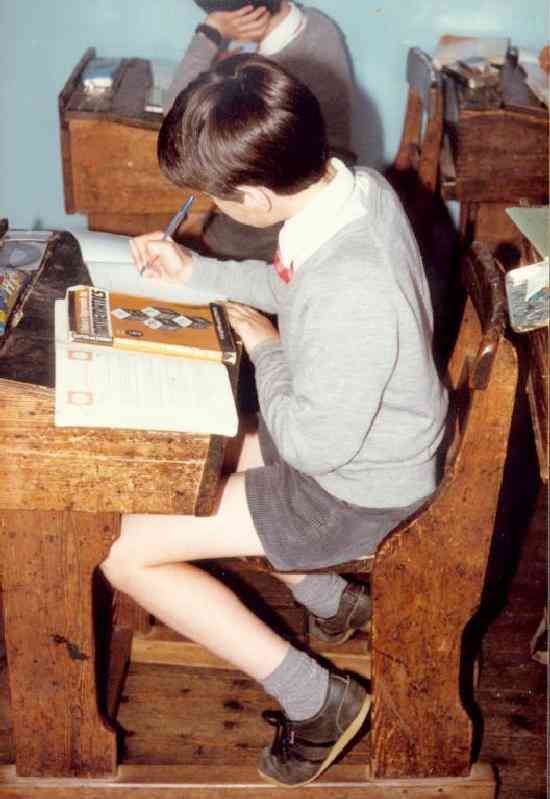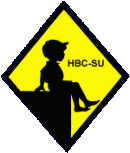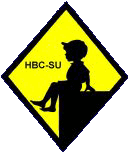
Figure 1.--Boys at this English preparatory school for class wore white shirts, ties, jumpers, cord shorts, and grey ankle socks. The jumpers were optional. They could choose choes or sandals. |

|
Uniform regulations in the classroom varied from school to school. State schools in most cases did not have a dress uniform. Private schools were most likely to have a different dress and classromm uniform--especially boarding schools. With only a few exceptions, the same uniform was worn for virtually all classes. Normally the class uniform was the same as the dress uniform, but with grey shirts and usually no blazers. Some schools had different trousers, wearing corduroy shorts to class. The most common attire in English classrooms is a jumper (sweater), tie, grey or white long-sleeved shirt, grey short or grey/black long trousers, ankle or kneesocks, and shoes or sandals. Variations affected these items. Some schools did not require ties in classess or at least during the summer. Grey shirts were common, but some schools had white shirts even as the classroom uniform. Jumpers were normally left up to the boy. There was normally a school rule about short and long trousers, usually based on age or form. There was also normally a regulation about the socks. Some schools shifted from knee socks to short socks during the summer. Footwear varied. Some schools selected shoes or sandals. The most common choices were black oxfords or brown school ("t" steap) sandals. Others left it up to the individual. While this was the normal classroom uniform , protective smocks or other grar was worn for some classess. There were also classess in which the children would dress up for special ptrojrcts or presentations. One example is a class project on a historical event like World War II evacuations.
Uniform regulations in the classroom varied from school to school. State schools in most cases did not have a dress uniform.
Private schools were most likely to have a different dress and classromm uniform--especially boarding schools. This of course has vaeied over time. Students were omce expected to dress more formally than is the case today. This commonly included formal Eton collsrs and suit jaxkets or blazers. A more casual approach is noww common, although this varies from school to school. With only a few exceptions, the same uniform was worn for virtually all classes. Normally the class uniform was the same as the dress uniform, but with grey shirts and usually no blazers. Some schools had different trousers, wearing corduroy shorts to class. The most common attire in English classrooms is a jumper (sweater), tie, grey or white long-sleeved shirt, grey short or grey/black long trousers, ankle or kneesocks, and shoes or sandals. Variations affected these items. Some schools did not require ties in classess or at least during the summer. Grey shirts were common, but some schools had white shirts even as the classroom uniform. Jumpers were normally left up to the boy. There was normally a school rule about short and long trousers, usually based on age or form. There was also normally a regulation about the socks. Some schools shifted from knee socks to short socks during the summer. Footwear varied. Some schools selected shoes or sandals. The most common choices were black oxfords or brown school ("t" steap) sandals. Others left it up to the individual. While this was the normal classroom uniform , protective smocks or other grar was worn for some classess. There were also classess in which the children would dress up for special ptrojrcts or presentations. One example is a class project on a historical event like World War II evacuations.
Related Chronolgy Pages in the Boys' Historical Web Site
[Main Chronology Page]
[The 1880s]
[The 1930s]
[The 1940s]
[The 1950s]
[The 1960s]
[The 1970s]
[The 1980s]
Related Style Pages in the Boys' Historical Web Site
[Main school uniform page]
[Main country page]
[Long pants suits]
[Short pants suits]
[Socks]
[Eton suits]
[Jacket and trousers]
[Blazer
[School sandals]
Navigate the Boys' Historical Clothing Web Page
[Return to the Main English regular school uniform page]
[Introduction]
[Activities]
[Biographies]
[Clothing styles]
[Chronology]
[Countries]
[Bibliographies]
[Contributions]
[FAQs]
[Glossary]
[Images]
[Links]
[Registration]
[Tools]
[Boys' Clothing Home]
